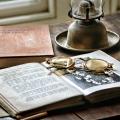This impressive building, No.15 on the south side of Bridge Street, was the old-established grocers Dowling and Sherwood.
The stone columns with Corinthian-style capitals exude everything that a reputable business would want to convey to its customers and, like others in the town, Dowling and Sherwood had a name for excellent service and quality.
In this picture of 1907, Henry Sherwood - wearing a boater - is standing to the right.
The site was once that of the Bush inn, a 17th century alehouse that developed into a coaching inn.
But like all these large inns, it suffered from a decline in trade during the mid 19th century when the railways put an end to regular coaching traffic. Consequently, after buying the old inn in 1854, local businessman Henry Dowling demolished it and built an imposing residence and shop in its place.
As H Dowling and then later as Dowling and Sherwood, the shop was an agent for Alsopp’s and Whitbread’s breweries and supplied a variety of fine teas, as well as Harris’ Wiltshire bacon, every form of cheese and, what were then considered breakfast delicacies - galantines, rolled ox tongues and potted meats.
The Victorian term ‘Italian warehouseman’ was added at some point, meaning that there was a wide choice of bottled oils and sauces, that may or may not have ever seen Italy.
Henry Dowling married Adelaide Bracher in 1857 and one of their daughters, Adeline, married Henry Sherwood in 1887, thus the shop became Dowling and Sherwood.
Both Henry Dowling and Henry Sherwood were mayors of Andover, the former in 1872 and the latter in 1895 and 1901.
After the Sherwood marriage, the Dowlings moved to a new house called ‘Westfield’ in Weyhill Road, leaving their daughter and son-in-law to run the Bridge Street shop.
Henry Dowling lived until the age of 83 and died in 1911; his son-in-law Henry Sherwood died only a little later in 1917 and the business was then taken on by the latter’s son, Frank H Sherwood, who continued to run the shop until the late 1950s, though he and his family never lived on the premises.
After 1907, most of the residential part of the building became the Temperance Hotel, run by William Higgins.
Perhaps its name did not encourage visitors and it was soon changed to the Central Hotel, though it still could not sell alcohol.
This seems to be because Henry Dowling and his successors themselves retained the liquor licence for the premises, in order to sell it in the shop.
Businesses often last for three generations and then fail, sometimes because the next generation does not want it or because the business model becomes outdated.
Perhaps here it was both. Henry Dowling’s building was demolished during the 1960s and replaced with the new shop units we see today but the Central Hotel in Bridge Street had already ceased to trade around 1930.
Mr and Mrs Charles Churchouse were then the proprietors and they took the name with them when they opened the hotel at the bottom of Western Road.
The building, originally The Knoll, had for many years belonged to the Westbury family.
That of course has also now gone, replaced by Charles Dalton Court.







Comments: Our rules
We want our comments to be a lively and valuable part of our community - a place where readers can debate and engage with the most important local issues. The ability to comment on our stories is a privilege, not a right, however, and that privilege may be withdrawn if it is abused or misused.
Please report any comments that break our rules.
Read the rules hereLast Updated:
Report this comment Cancel